Desierto de la Tatacoa (Tatacoa Desert) is a desert located in the Colombian Department of Huila, which is located about 24 miles (38 km) from the city of Neiva in Colombia. In addition, Tatacoa Desert is considered the second largest arid zone in Colombia
The stunning and surreal desert landscapes in the area as well as fossil remains plus being considered a good location for star gazing make it a popular tourist area. Tatacoa has almost no pollution or noise. So, it attracts tourists who enjoy the silence, scenery and tranquility. But it is still off the beaten path for foreigner tourists.
Technically, the Tatacoa Desert is not really a proper desert. And some say it is semi-desert and others say it’s a semi-arid dry tropical forest. You can sometimes experience rain at night in the area. Also, the area is heavily eroded and has dry canyons that develop transiently.
This desert area is filled with rocky canyons that form dry labyrinths in red and grey colors that are interrupted by occasional green bushes.

Tatacoa Desert – the Cuzco area
Desierto de la Tatacoa – the Tatacoa Desert
The Tatacoa Desert is the second largest desert area in Colombia after the Guajira Peninsula. Tatacoa Desert is sized at about 127 square miles (330 square kilometers).
The Tatacoa Desert has two distinctive colors: ocher (natural reddish clay) in the area of Cuzco and grey moon-like terrain in the Los Hoyos area. In addition, the name “Tatacoa” reportedly refers to rattlesnakes in the area when the Spanish first discovered it.

Tatacoa Desert – the Los Hoyos area, photo by Aliman5040
Animal and plant life in the area has adapted to the conditions of low humidity and high temperatures.
In Tatacoa Desert you can find cacti reaching up to 16 feet (five meters) high. Also, you can find rodents, scorpions, snakes, spiders and over 70 different species of birds.

The Tatacoa Observatory
Top 5 Things to Do in the Tatacoa Desert
1. Visit the Tatacoa Observatory. The location close to the equator and atmospheric conditions are perfect for observing the stars. In addition, the Tatacoa Desert does not have light or auditory pollution.
So, with clear skies throughout the year, you can see an astonishing number of stars at night in the desert.
At 6:30 pm each night, the astronomer in the observatory provides a lesson about the stars. And you will have the opportunity to see stars and planets with a high-powered telescope. In addition, the price is only 10,000 pesos per person.

The Tatacoa Desert, photo by Karolynaroca
2. Take a bike tour. Tatacoa Bicitour offers comprehensive tours of the desert with great equipment, bikes and helmets. But make sure to drink lots of water – it’s quite hot but also dry.
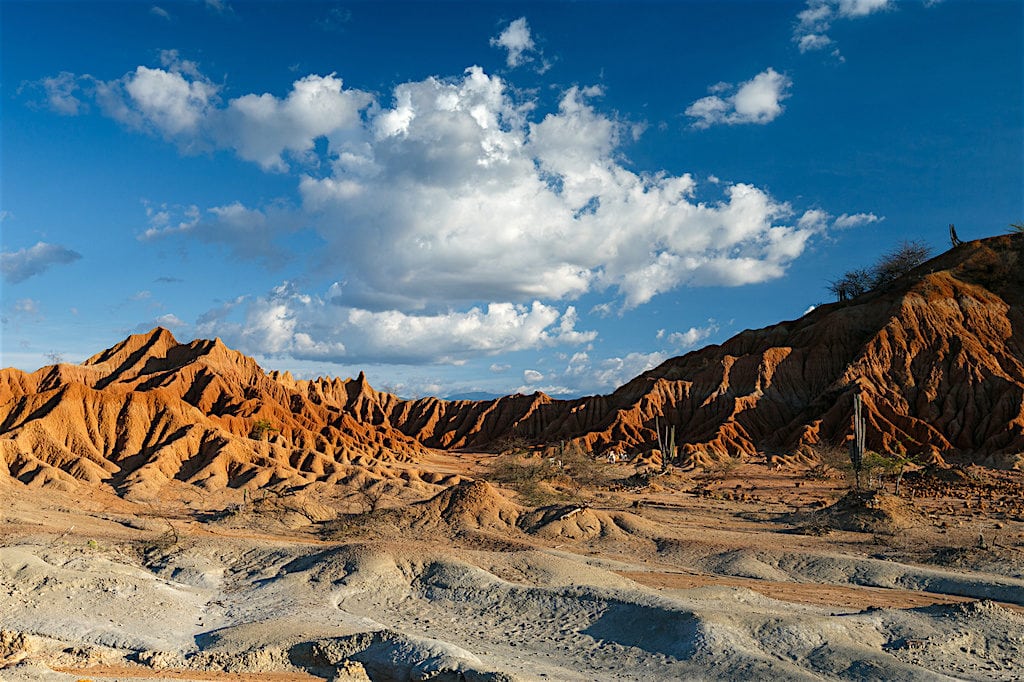
A Tatacoa Desert landscape
3. Take a guided tour. Hotels and hostels in the area can organize tours for you or can suggest guided tours in the area.
The price of these guided tours will depend on the number of people in your group and on your negotiating skills. It will usually be at least 30,000 pesos per person. And tours typically last about two to three hours. Also, you will go around the desert area and typically on a small hike.
4. Relax and enjoy the peace and quiet. Try to choose a hotel or hostel with a pool and hammocks. So, after a hot day of hiking or biking in the desert you can just sit back and relax and enjoy the natural beauty.
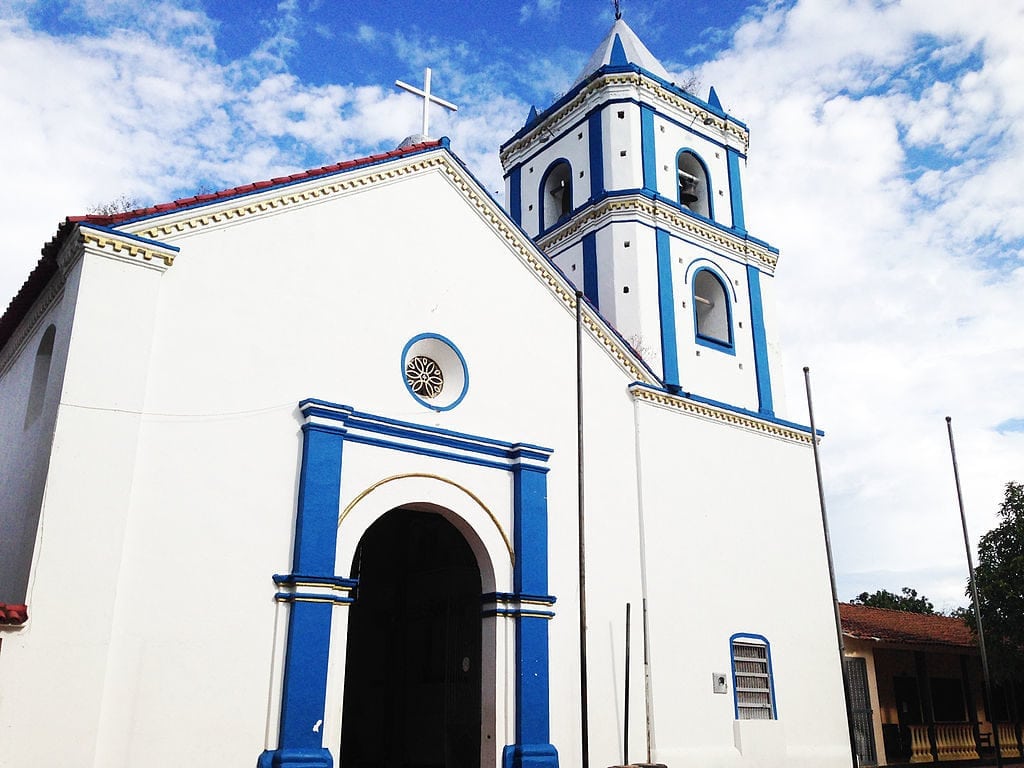
Iglesia Nuestra Señora Del Socorro in Villavieja, photo by Miguel Cardenas
5. Visit Villavieja. The small town of Villavieja is considered the gateway to Tatacoa Dessert. However, some tourists arrive and go straight to the desert.
But Villavieja is an attractive small-town worth visiting. It has a nice main square and is home to a Museo Paleontoligico (Paleontology Museum) with a collection of over 600 fossils discovered in the Tatacoa Desert.
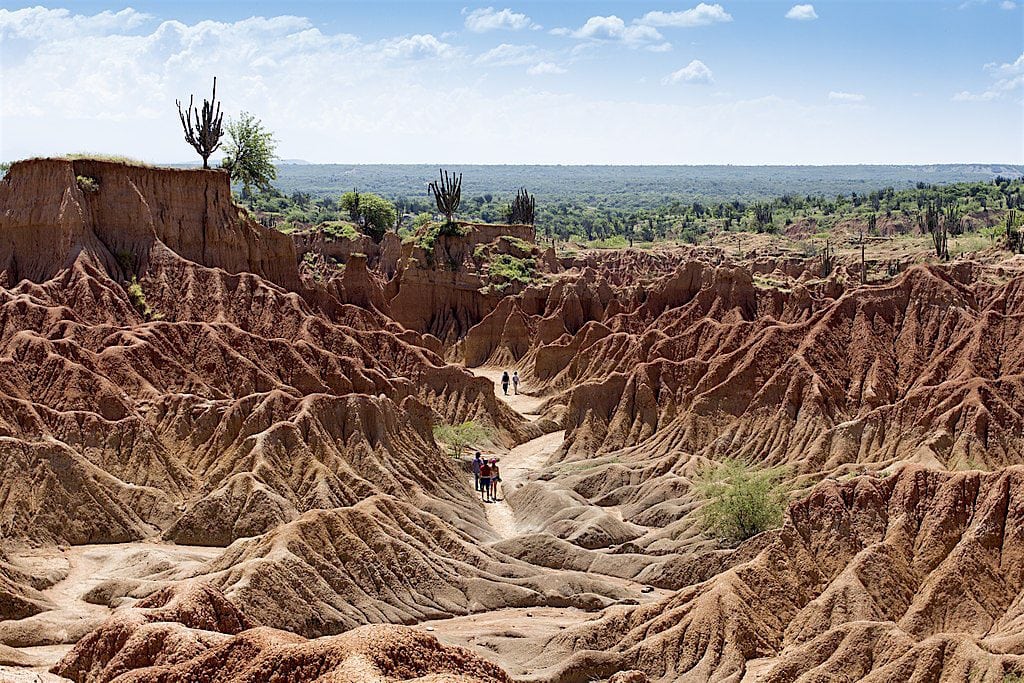
The Tatacoa Desert, photo by Yair Alfronso Murillo Rincón
Tatacoa Desert Tips
We have three main tips for travelers visiting the Tatacoa Desert:
Tip 1. Hot weather. Keep in mind it is quite hot and temperatures can easily reach 104°F (40°C). So, drink lots of fluids and wear light clothes. Also, try not to schedule tours during the hottest part of the day.
Tip 2. Insects. If you stay in the desert, keep in mind that you will be in close contact with nature including spiders, mosquitos and other insects. So, use insect repellent or if you can’t handle insects, stay in hotels outside of the desert.
Tip 3. Electricity. There is not much electricity found in the desert. So, bring a flashlight, as it will be pitch dark at night. Also, some places don’t have outlets in the rooms and there are only shared outlets in common areas.

View in the Tatacoa Desert, photo by Edgar Jiménez
How to Get to the Tatacoa Desert
The nearest city to the Tatacoa Desert is Neiva, the capital of the Huila department in Colombia. Neiva is about 24 miles (38 km) from Tatacoa Desert.
It is possible to fly directly to Neiva from the El Dorado airport in Bogotá on either Avianca or EasyFly. And if flying from Medellín or another city, you will need to connect in Bogotá.
In addition, buses are available to Neiva from other cities in Colombia like Bogotá or Medellín.
Once you are in Neiva, from the Neiva bus station, you can catch a colectivo (shared) car to the small town of Villavieja, which is known as the gateway to the Tatacoa Desert.

Entrance to the Tatacoa Desert, photo by Gerson Barrera
And from Villaveija, you can catch a taxi or tuk-tuk to the desert, which is located only about 10 minutes from the edge of the town. Also, some drivers will even offer to drive you around on a day-trip of the desert.
Where to Stay in the Tatacoa Desert
Some tourists who visit the Tatacoa Desert stay in the city of Neiva where there are more options. Neiva has a population of nearly 400,000, so there are several hotel, hostel and Airbnb options in Neiva.
But many tourists who visit decide to stay in the desert or in nearby Villavija. Due to the Tatacoa Desert attracting an increasing number of tourists, there are several hotels and hostels are in the area with a range of prices.
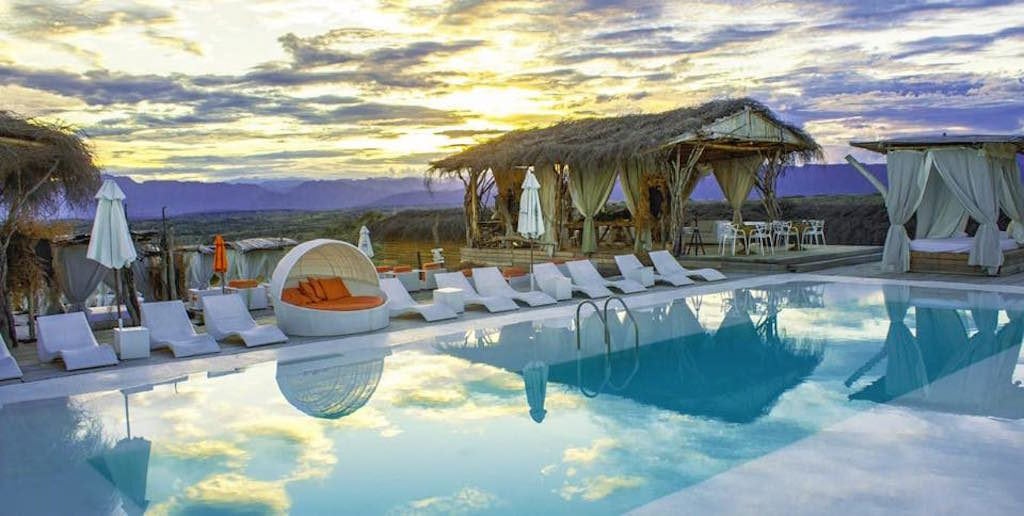
Pool at the Bethel Bio Luxury Hotel, photo courtesy of Bethel Bio Luxury Hotel
Probably the best hotel in the area is the Bethel Bio Luxury Hotel. And it’s a pretty unique hotel in the area with a pool with great views of the surrounding desert landscapes. But it’s also pricy for the area with a room rate or eco-pod rate of over 600,000 pesos per night. But it would be good place for a romantic trip.
For budget travelers, a short five-minute walk from the observatory in the desert there are a few options including Hostel Noches de Saturno and Sol de Verano, both with private rooms for 30,000 pesos or 10,000 pesos for a hammock. But warning it can get very hot in the rooms.
In Villavieja, Hotel Villa Paraíso is an option with air-conditioning in the rooms and prices starting at about 80,000 pesos for a room with a double bed. And Hotel Colonial Villavieja is another option with rooms starting at about 130,000 pesos for two guests and free breakfast.
Top Things to See and Do in Colombia
On the Medellin Guru website, we have been looking at some of the most beautiful places in Colombia in a series of top things to see and do in Colombia. This is due to many readers asking about several of these things to do in Colombia.
We have looked at 20 of the top things to see and do in Colombia, in alphabetical order:
- Caño Cristales – the most beautiful river in Colombia, which has also been called the most beautiful river in the world by some people.
- Carnival in Barranquilla – the second largest carnival in the world.
- Cartagena – Oozing history, romance and sun-drenched beaches, the allure of historical Cartagena is hard to resist.
- Ciudad Perdida – the site of an ancient city in Colombia that is older than Machu Picchu in Peru.
- Colombia’s Pacific coast – often overlooked by tourists visiting Colombia but offering untamed nature and undiscovered beauty that is off the beaten path for most foreign tourists.
- Desierto de la Tatacoa – the second largest arid zone in Colombia is Tatacoa Desert, which has surreal desert landscapes and some of the best stargazing in Colombia.
- Guatapé – a picturesque pueblo near Medellín known for its huge rock and lake. And it’s likely the most visited pueblo in Colombia by foreigners.
- La Guajira Peninsula – one of the most visually stunning places in South America, which is located on the northern tip of Colombia where the desert meets the sea.
- Las Lajas Sanctuary – the most beautiful church in Colombia, which has also been called the most beautiful church in the world.
- Medellín’s Christmas lights – Medellín’s annual world-class Christmas lights known as Alumbrados Navideños.
- Medellín’s Feria de Las Flores – Medellín’s world-famous flower festival each year.
- Parque Nacional Natural Los Nevados – a popular national park in Colombia located in the heart of the Colombian coffee region.
- Parque Tayrona – known for its beautiful beaches and the world’s highest coastal mountain range.
- Popayán – a colonial gem in Colombia best known for its white buildings and churches, it’s a city off the beaten path for foreign tourists but is definitely worth visiting.
- Rio Claro Nature Reserve – located about three hours from Medellín, Rio Claro is the perfect place to unplug from hectic daily life and enjoy a picturesque crystal-clear river, canyon and tropical rainforest.
- Salento and the Cocora Valley – Salento is a picturesque pueblo in Colombia’s coffee region and the nearby Cocora Valley is one of the most striking landscapes found in Colombia.
- San Agustín Archaeological Park – the largest group of pre-Columbian monuments and megalithic statues in South America and is a UNESCO World Heritage Site.
- San Andrés – Colombia’s Caribbean island which is a UNESCO World Biosphere Reserve featuring many beaches, islets and coral reefs that are filled with flora and fauna.
- San Gil – Colombia’s adventure capital that is full of things to do including white water rafting, paragliding, caving, rappelling, hiking and much more.
- San Jose del Guaviare – a hidden gem and eco-tourism location off the beaten path and offering wildlife watching, jungle trekking and delving into Colombia’s prehistoric past.
Also, we included Desierto de la Tatacoa in our list of the top 20 tourist attractions in Colombia.
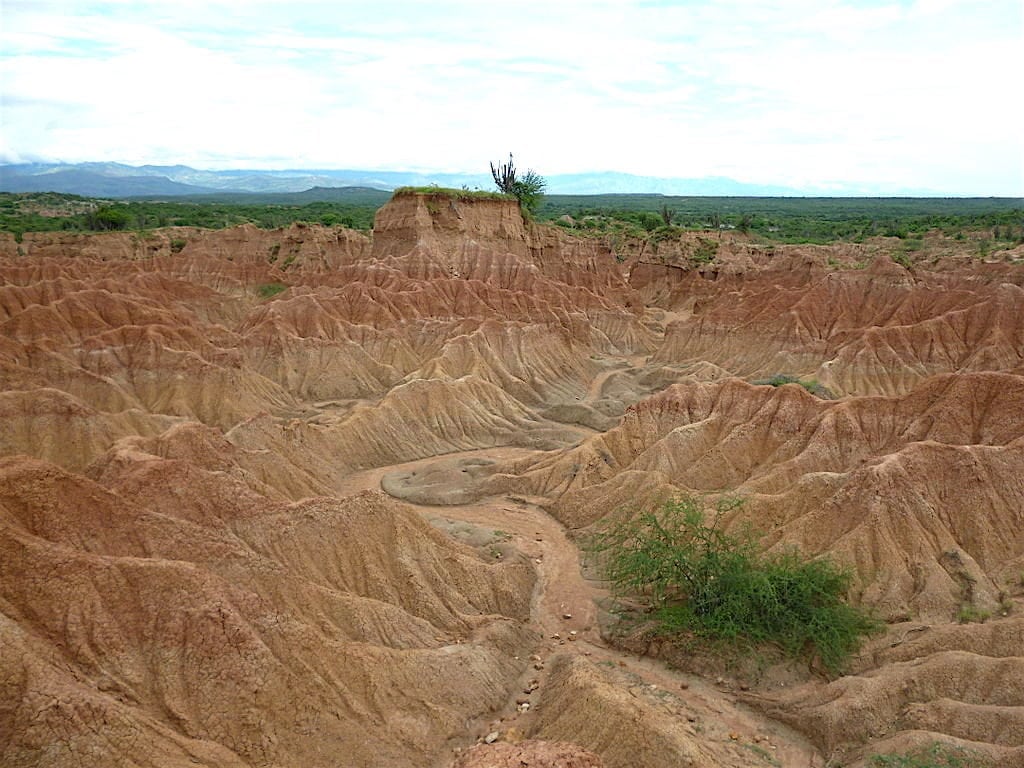
One of the many amazing views possible in the Tatacoa Desert in Colombia, photo by Aliman5040

Another of the many amazing views possible in Desierto de la Tatacoa – the Tatacoa Desert in Colombia
The Bottom Line: Desierto de la Tatacoa – the Tatacoa Desert
Tatacoa Desert provides access to some stunning and surreal desert landscapes in Colombia. When I visited a few years ago I found it to be an amazing experience that I highly recommend.
Tatacoa Desert is located in the middle of nowhere. So, it’s an incredibly quiet place and a great place to enjoy the natural beauty in the area with some amazing views.
Sign up for the Free Medellin Guru Newsletter – You can see all of the previous Medellin Guru weekly email newsletters and sign up here.

